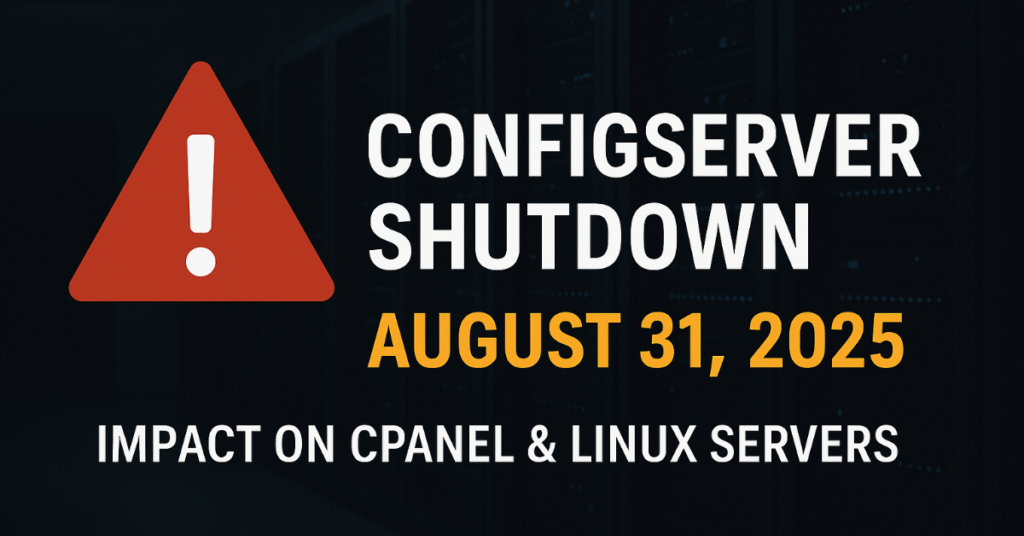
On 31st August 2025, the long-standing security software provider ConfigServer will officially close down. This announcement has raised serious concerns for web hosting providers, server administrators, and businesses that rely on ConfigServer’s trusted plugins to secure and manage their servers.
In this article, we’ll explain what the shutdown means, which tools will be impacted, and how you can prepare your Linux or cPanel server for this change.
What is ConfigServer?
ConfigServer Services Ltd. is a well-known developer of server security and management tools. For nearly two decades, their solutions have been the go-to choice for cPanel server owners. The most popular tools from ConfigServer include:
- ConfigServer Security & Firewall (CSF): A powerful firewall and security suite.
- ConfigServer Exploit Scanner (CXS): Detects and removes malicious files and scripts.
- Outgoing Spam Monitor (OSM): Prevents abuse of outgoing email systems.
- MailScanner Front-End (MSFE): Integrates with MailScanner for email security.
These plugins are widely used by hosting providers, system administrators, and Linux enthusiasts to maintain server security and stability.
Why is ConfigServer Shutting Down?
According to the official announcement, ConfigServer will cease operations due to business reasons and changing priorities in the hosting security ecosystem. While the company did not provide extensive details, it is clear that all plugin updates and new license sales will stop after August 31, 2025.
For server administrators, this means:
- No future security updates.
- No bug fixes or patches.
- No new installations or license renewals.
- No official support.
This makes it critical for server owners to start planning migration strategies now.
Impact on cPanel and Linux Server Owners
If your server relies on ConfigServer plugins, you could face several issues after the shutdown:
- Security Risks – Without updates, vulnerabilities in CSF, CXS, or MSFE may go unpatched, leaving servers exposed to attacks.
- Compatibility Issues – Future versions of cPanel, WHM, or Linux distributions may not fully support outdated ConfigServer tools.
- Spam and Malware Control – The discontinuation of OSM and CXS could make spam detection and exploit scanning less effective.
How to Prepare for the ConfigServer Shutdown
To minimize disruption, administrators should take the following steps before 31st August 2025:
- Audit Your Server – Identify which ConfigServer plugins are currently installed.
- Check Alternatives – Research security and firewall solutions that are actively maintained. Popular alternatives include:
- CSF alternatives like Imunify360, APF Firewall, or native iptables with fail2ban.
- Malware scanning tools like ClamAV or ImunifyAV.
- Email spam filtering via SpamAssassin or third-party gateways.
- Plan a Migration – Gradually replace ConfigServer tools with supported software.
- Backup Configurations – Keep a backup of your firewall and security settings for smooth migration.
- Monitor cPanel Updates – cPanel may release its own recommendations and tools for users affected by this shutdown.
Long-Term Considerations
While ConfigServer’s shutdown may feel like the end of an era, it also presents an opportunity to adopt more modern, cloud-friendly, and AI-driven security solutions. Many hosting providers are moving towards integrated solutions that combine malware scanning, firewall protection, and real-time monitoring under a single dashboard.
For Linux administrators, this is also the right time to:
- Strengthen monitoring policies.
- Enhance server hardening practices.
- Regularly review firewall rules and intrusion prevention systems.
By acting early, you can ensure your servers remain secure and stable even after ConfigServer disappears from the hosting landscape.
References